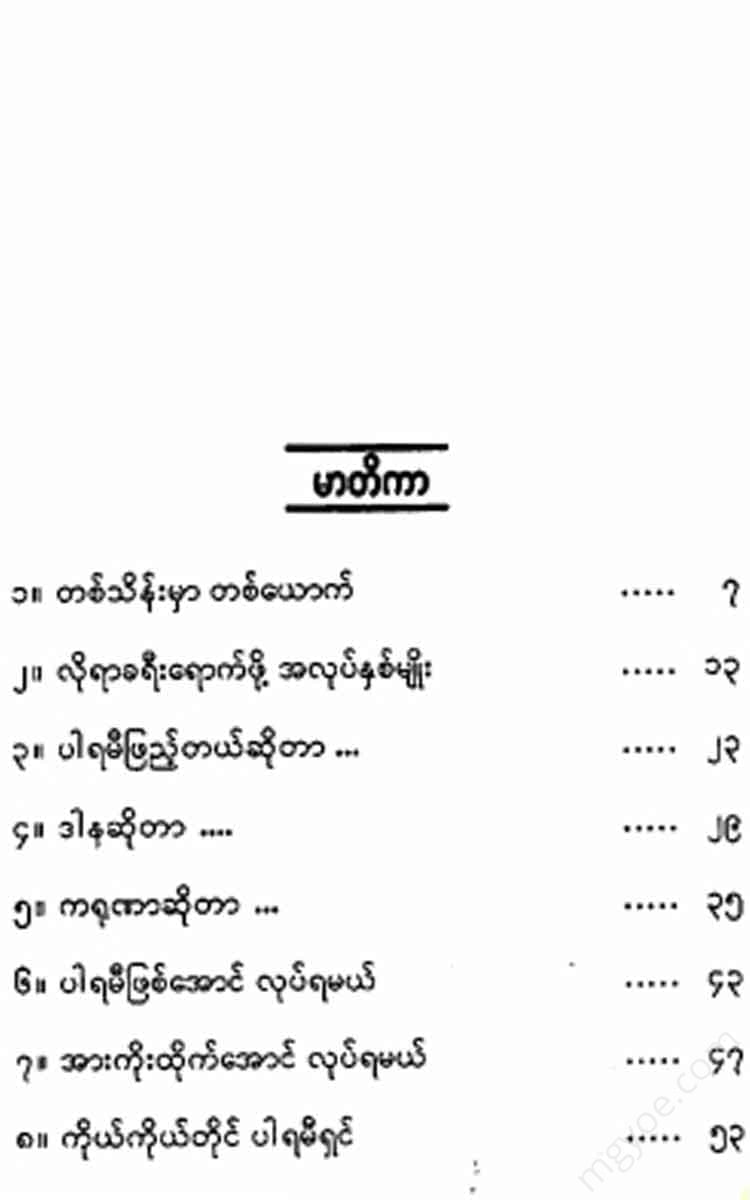Other Websites
Dhammaduta Ashin Sekinda - To reach the desired destination
Dhammaduta Ashin Sekinda - To reach the desired destination
Couldn't load pickup availability
One in a thousand
Let's say there are a million people in the world.
Two-thirds of the 100,000 people gathered liked the beauty. They liked the good looks.
If there are 100,000 people, four-fifths of them like being famous and having a good voice.
Nine out of ten thousand people like to live a life of austerity and austerity.
If there are a hundred thousand people, only one -
Virtue,
Integrity,
I like the true teachings, they are so different.
The Buddha is full of beauty, grace, and dignity, and I must say, even more so.
Who else could be different?
Famous in ten thousand universes, and his voice is unmatched by anyone.
Although the Buddha's great glory and great wealth are abundant,
He practiced the four essentials of food, clothing, school, and medicine with great care.
This is also an honor.
I practice so that no one can compare.
There is virtue,
There is integrity.
There is wisdom, and these teachings are incomparable to the Buddha.
In fact, those three are the true Dharma.
Not everyone can believe in this true Dharma.
Two-thirds of a hundred thousand people are 66,666.
Those 66,666 people admire the beauty of their appearance.
If you look at 4/5, that's 70,000 people.
80,000 people admire a good voice and fame.
Nine tenths is 90,000.
Ninety thousand people will respect the four things and practice them with humility.
They generally believe in austerity, austerity in diet, and suffering.
Only one in a hundred thousand people respect the true Dharma, namely virtue, integrity, and wisdom.
Only one in a hundred thousand people truly appreciate the virtue, integrity, and wisdom of the Buddha.
If there are fifty thousand people, how many will believe in the true Dharma? Not even one person will fully believe, only half will.
I want to understand this concept.
Two jobs to get to your destination
I would like to give you the Dhamma gift of the words and instructions of the venerable Waso Sayadaw. There is no need to memorize them again. Sayadaws and monks have always received them, and some individuals may have already received them.
The words of the Waso Sayadaw are -
"There are only two things that the Buddha has commanded us to do. Do only those two things. If we do three, four, or five things, we will be confused. For those who want to reach Nibbana, we must do both."
As Buddhists, we have a desire to attain Nibbana. In fact, this great Dhamma is not only for Buddhists, but also for other religions, including non-Buddhists.
To reach your destination, you only need to do two things.
Everyone can travel.
There are journeys for walking, there are journeys for doing business, there are journeys for buying and selling, and there are journeys for socializing.
Not a Buddhist.
No matter who you are, you only need to do two things to get to your destination.
For individuals who want to reach Nibbana, there are two things they must do.
Thank you, Venerable Waso Sayadaw.
Aye... I'm doing missionary work.
If you are feeling stressed or anxious, always keep this in mind. Recite it once a day.
When people are going through important things like economic, social, and other things to reach their desired destination, they sometimes experience disappointment and disappointment.
Then take this little lesson to heart. I am so grateful to you.
The Dhamma that must be taken to heart is that if you want to reach Nibbana, there are only two things you need to do.
These two are..
(1) Now, become a monk.
(2) If you have not yet become a monk, complete the parami.
For Buddhists, we also know what a monk is. We also know what a paramita is.
For other religions, even if you don't know about arahants and paramis, you still need to do two things if you want to reach your destination.
Regardless of race or religion, if you want to reach your destination, you have to do two things.
These two are -
(1) If you arrive immediately, go.
(2) If you don't get there right away, go slowly.
If you want to be educated, you have to do two things. Those two things are:
(1) If you were educated right now,
(2) If not, study slowly.
If you want to reach your destination, go immediately. If you don't want to go immediately, go slowly. Isn't the word "go slowly" a metaphor?
If you go to get there immediately, you go, and if you don't get there immediately, even if you go slowly, you are still getting there.
If you want to become rich, you have to work hard to become rich, whether you are rich right away or not. If you are educated, you have to do things that will make you educated, gradually.
Don't think that perfection is anything else.
This little bit of kindness, this little bit of motivation, this little bit of spirit is leading me to reach the shore I want and long for.
That is called Parami.
For a doctor, studying to become a doctor is a virtue.
For an engineer, studying to become an engineer is a virtue.
For someone who wants to be rich, it is a talent to do business to become rich. It is said that talent is because a good heart leads and other good hearts are present.
This is an explanation of the meaning of parami. But these cannot be called parami yet.
The perfection is the perfection of the Buddha, the perfection of all the noble ones, the perfection of the great ascetics, the perfection of the great ascetics, the perfection of the Buddhas , and the perfection of the natural ascetics is to reach Nibbana.
The desired destination is Nibbana. To reach Nibbana and to do the work that will lead to Nibbana is perfection.
If you understand this concept, then anyone who wants to become a doctor should immediately become a doctor.
If you can't do it right away, do it slowly. Make it what you want to be. You have to go where you want to go. If you want to get there, go there.
It's his part to arrive or not, it's your part to leave.
Parents don't need to scold their children too much when they are being overly demanding. They don't need to scold them either.
If you explain this concept in a way that makes sense, you will understand.
"You will know that by doing your job, you become what you want them to be."
Doing your own work is called fulfilling the paramita, if it is the work that will lead to Nibbana.
In other areas, such as economics, growth, social work, and education, the work we do every day can lead to Nirvana.



